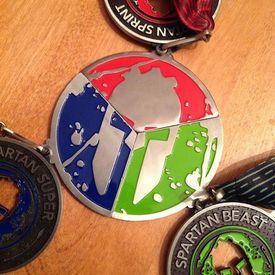Misconceptions of Organic food(s)

magerum
Posts: 12,589 Member
This will probably be TL;DR for most, but here it is anyways.
It is the opinion of many Americans that organic food is healthier and safer than conventional foods; an opinion that the organic food industry strives to cultivate. However, as former Agriculture Secretary Dan Glickman pointed out, "The organic label is a marketing tool. It is not a statement about food safety."
One major misconception about the organic food industry is that their products are not grown using pesticides. This is not entirely accurate. It is true that organic producers do not use any synthetic pesticides. However, they use many "organic" pesticides, which are pesticides derived from natural products. As Alex Avery of the Center For Global Food Issues points out, "Organic pesticides are the most heavily used agricultural pesticides in the U.S." Pesticides used by organic farmers account for over 25% of the total pesticide use in the United States. This figure does not include the most commonly used organic pesticide, Bt, because it cannot be measured in pounds per active chemical use. Also, many other common organic pesticides are not included in this figure because they are not measured, either.
Two of the most common organic pesticides, copper and sulfur, are used as fungicides by organic growers. Because they are not as effective as their synthetic counterparts, they are applied at significantly higher rates. This is disturbing because both sulfur and copper have greater environmental toxicity than their synthetic counterparts. The two most commonly used insecticides by organic farmers are Bt and oil (usually petroleum or soybean oil). However, a substantial amount of oil has to be used to achieve the same results as synthetic insecticides. Other organic pesticides are generally extracted from plants. One such pesticide, pyrethrum, has a demand satisfied by the hand harvest of about 600 million flowers per year. This accounts for a significant amount of green space that could otherwise be used as wildlife preserve or to grow food.
One type of pesticide that organic growers admittedly do not use, in any form, are herbicides. However, the development of herbicides has led to low-till farming methods that significantly decrease soil erosion and increase the sustainability of agricultural land. Bereft of this option, organic growers must rely on methods that lead to increased soil erosion, unless they maintain a strict crop rotation schedule.
Another type of pest control used by organic growers is so-called "biocontrol" techniques. This type of pest control relies on insects, fungi, or bacteria to destroy pests that are harmful to crops. Organic farmers promote this as a less environmentally damaging method of pest control. However, the introduction of such biocontrol can have a debilitating effect on local ecosystems. Since most biocontrol organisms are not native to the areas in which they are employed, they have led to substantial ecological devastation in several areas.
Not only do organic farmers make the claim that their products are environmentally safe, they also claim that organic products are healthier. However, there is no evidence that this is the case. In addition, organic produce causes an increased risk of food poisoning. According to the CDC, 36% of people suffering from E. coli O157:H7 infection contracted it from organic food. This strain of E. Coli is particularly vicious-it kills thousands of people every year, and can cause substantial damage to the liver or kidneys. Organic foods are susceptible to E. Coli infection because manure and compost are commonly used fertilizers in organic farming, and both often contain large amounts of the bacteria.
Although organic farms make the claim that their products are better for the environment, produce less toxic chemicals, and are safer and healthier, the facts do not seem to bear these claims out. Although it is true that there are potential long-term health threats stemming from the use of synthetic fertilizers, the evidence for such a threat has yet to be substantiated in the nearly 40 years since this danger was first identified in Rachel Carson's Silent Spring. However, the risks of using organic foods are known and substantiated. This is not to say that organic foods are substantially unsafe-feel free to eat organic. Just be aware that the extra bucks that you're shelling out don't provide an extra dime of safety or nutrition.
Read the links below. I pulled out the more important ones. Stuff labeled "Organic" isn't what you think.
Electronic Code of Federal Regulations
http://www.ecfr.gov/cgi-bin/text-idx?c=ecfr&sid=3f34f4c22f9aa8e6d9864cc2683cea02&tpl=/ecfrbrowse/Title07/7cfr205_main_02.tpl
§ 205.601 Synthetic substances allowed for use in organic crop production.
http://www.ecfr.gov/cgi-bin/text-idx?c=ecfr&SID=9bfd46a9344e3e012d60638859ce1ded&rgn=div8&view=text&node=7:3.1.1.9.32.7.354.2&idno=7
§ 205.603 Synthetic substances allowed for use in organic livestock production.
http://www.ecfr.gov/cgi-bin/text-idx?c=ecfr&SID=9bfd46a9344e3e012d60638859ce1ded&rgn=div8&view=text&node=7:3.1.1.9.32.7.354.4&idno=7
§ 205.605 Nonagricultural (nonorganic) substances allowed as ingredients in or on processed products labeled as “organic” or “made with organic (specified ingredients or food group(s)).”
http://www.ecfr.gov/cgi-bin/text-idx?c=ecfr&SID=9bfd46a9344e3e012d60638859ce1ded&rgn=div8&view=text&node=7:3.1.1.9.32.7.354.6&idno=7
§ 205.606 Nonorganically produced agricultural products allowed as ingredients in or on processed products labeled as “organic.”
http://www.ecfr.gov/cgi-bin/text-idx?c=ecfr&SID=9bfd46a9344e3e012d60638859ce1ded&rgn=div8&view=text&node=7:3.1.1.9.32.7.354.7&idno=7
It is the opinion of many Americans that organic food is healthier and safer than conventional foods; an opinion that the organic food industry strives to cultivate. However, as former Agriculture Secretary Dan Glickman pointed out, "The organic label is a marketing tool. It is not a statement about food safety."
One major misconception about the organic food industry is that their products are not grown using pesticides. This is not entirely accurate. It is true that organic producers do not use any synthetic pesticides. However, they use many "organic" pesticides, which are pesticides derived from natural products. As Alex Avery of the Center For Global Food Issues points out, "Organic pesticides are the most heavily used agricultural pesticides in the U.S." Pesticides used by organic farmers account for over 25% of the total pesticide use in the United States. This figure does not include the most commonly used organic pesticide, Bt, because it cannot be measured in pounds per active chemical use. Also, many other common organic pesticides are not included in this figure because they are not measured, either.
Two of the most common organic pesticides, copper and sulfur, are used as fungicides by organic growers. Because they are not as effective as their synthetic counterparts, they are applied at significantly higher rates. This is disturbing because both sulfur and copper have greater environmental toxicity than their synthetic counterparts. The two most commonly used insecticides by organic farmers are Bt and oil (usually petroleum or soybean oil). However, a substantial amount of oil has to be used to achieve the same results as synthetic insecticides. Other organic pesticides are generally extracted from plants. One such pesticide, pyrethrum, has a demand satisfied by the hand harvest of about 600 million flowers per year. This accounts for a significant amount of green space that could otherwise be used as wildlife preserve or to grow food.
One type of pesticide that organic growers admittedly do not use, in any form, are herbicides. However, the development of herbicides has led to low-till farming methods that significantly decrease soil erosion and increase the sustainability of agricultural land. Bereft of this option, organic growers must rely on methods that lead to increased soil erosion, unless they maintain a strict crop rotation schedule.
Another type of pest control used by organic growers is so-called "biocontrol" techniques. This type of pest control relies on insects, fungi, or bacteria to destroy pests that are harmful to crops. Organic farmers promote this as a less environmentally damaging method of pest control. However, the introduction of such biocontrol can have a debilitating effect on local ecosystems. Since most biocontrol organisms are not native to the areas in which they are employed, they have led to substantial ecological devastation in several areas.
Not only do organic farmers make the claim that their products are environmentally safe, they also claim that organic products are healthier. However, there is no evidence that this is the case. In addition, organic produce causes an increased risk of food poisoning. According to the CDC, 36% of people suffering from E. coli O157:H7 infection contracted it from organic food. This strain of E. Coli is particularly vicious-it kills thousands of people every year, and can cause substantial damage to the liver or kidneys. Organic foods are susceptible to E. Coli infection because manure and compost are commonly used fertilizers in organic farming, and both often contain large amounts of the bacteria.
Although organic farms make the claim that their products are better for the environment, produce less toxic chemicals, and are safer and healthier, the facts do not seem to bear these claims out. Although it is true that there are potential long-term health threats stemming from the use of synthetic fertilizers, the evidence for such a threat has yet to be substantiated in the nearly 40 years since this danger was first identified in Rachel Carson's Silent Spring. However, the risks of using organic foods are known and substantiated. This is not to say that organic foods are substantially unsafe-feel free to eat organic. Just be aware that the extra bucks that you're shelling out don't provide an extra dime of safety or nutrition.
Read the links below. I pulled out the more important ones. Stuff labeled "Organic" isn't what you think.
Electronic Code of Federal Regulations
http://www.ecfr.gov/cgi-bin/text-idx?c=ecfr&sid=3f34f4c22f9aa8e6d9864cc2683cea02&tpl=/ecfrbrowse/Title07/7cfr205_main_02.tpl
§ 205.601 Synthetic substances allowed for use in organic crop production.
http://www.ecfr.gov/cgi-bin/text-idx?c=ecfr&SID=9bfd46a9344e3e012d60638859ce1ded&rgn=div8&view=text&node=7:3.1.1.9.32.7.354.2&idno=7
§ 205.603 Synthetic substances allowed for use in organic livestock production.
http://www.ecfr.gov/cgi-bin/text-idx?c=ecfr&SID=9bfd46a9344e3e012d60638859ce1ded&rgn=div8&view=text&node=7:3.1.1.9.32.7.354.4&idno=7
§ 205.605 Nonagricultural (nonorganic) substances allowed as ingredients in or on processed products labeled as “organic” or “made with organic (specified ingredients or food group(s)).”
http://www.ecfr.gov/cgi-bin/text-idx?c=ecfr&SID=9bfd46a9344e3e012d60638859ce1ded&rgn=div8&view=text&node=7:3.1.1.9.32.7.354.6&idno=7
§ 205.606 Nonorganically produced agricultural products allowed as ingredients in or on processed products labeled as “organic.”
http://www.ecfr.gov/cgi-bin/text-idx?c=ecfr&SID=9bfd46a9344e3e012d60638859ce1ded&rgn=div8&view=text&node=7:3.1.1.9.32.7.354.7&idno=7
0
Replies
-
I like it when smart people post smart stuff!
2 thumbs up 0
0 -
Very interesting. Thanks for the info.
 0
0 -
TL;DR0
-
In for the inevitable arguments.0
-
YUMMY. Roundup!0
-
In for the inevitable arguments.
I'm thinking it is probably TL:DR for anyone that would normally blindly defend organics, tbh.0 -
If no other part of this post is read, this is the most important part:...
It is the opinion of many Americans that organic food is healthier and safer than conventional foods; an opinion that the organic food industry strives to cultivate. However, as former Agriculture Secretary Dan Glickman pointed out, "The organic label is a marketing tool. It is not a statement about food safety."
...0 -
Animal treatment associated with inorganic foods is my problem.
but for all the people who will attack with PETA, etc http://www.youtube.com/watch?v=VMqYYXswono
http://www.youtube.com/watch?v=VMqYYXswono
Temple Grandin's video. Autistic woman smarter than 99% of the people out there.0 -
I do not disagree with you and I obviously do not disagree with the research and evidence.
However, the produce I eat is still 90% organic. There are many other reasons why I, and others, choose to buy organic produce.0 -
I do not disagree with you and I obviously do not disagree with the research and evidence.
However, the produce I eat is still 90% organic. There are many other reasons why I, and others, choose to buy organic produce.
You are more than entitled to eat anything you want. If it's not for "safety" or "extra nutrition" mind if I ask what the other reasons are?0 -
i bet its environmental and animal treatment like myselfI do not disagree with you and I obviously do not disagree with the research and evidence.
However, the produce I eat is still 90% organic. There are many other reasons why I, and others, choose to buy organic produce.
You are more than entitled to eat anything you want. If it's not for "safety" or "extra nutrition" mind if I ask what the other reasons are?0 -
So? What's your point exactly? That we should all gobble down regular GMO food sprayed with MORE pesticides?
Very logic.0 -
okay, but organic DOES mean NON-GMO. that alone is worth the extra cost to me.0
-
So? What's your point exactly? That we should all gobble down regular GMO food sprayed with MORE pesticides?
Very logic.
lol @ pesticides = GMO
thank god I can wash pesticides off
What makes you think you are an organic person?
You take medication dont you?0 -
I'm shocked at the number of people that seem to think organic means homegrown or available at Farmer's Markets. I'm not sure if they even tie it to pesticides, or just think no one local would use pesticides.
My biggest beef is the pesticides that are systematically wiping out the honeybee population.0 -
So? What's your point exactly? That we should all gobble down regular GMO food sprayed with MORE pesticides?
Very logic.
lol @ pesticides = GMO
thank god I can wash pesticides off
What makes you think you are an organic person?
You take medication dont you?
Where did you see that I said pesticides = GMO. Can't read?0 -
So? What's your point exactly? That we should all gobble down regular GMO food sprayed with MORE pesticides?
Very logic.
lol @ pesticides = GMO
thank god I can wash pesticides off
You can only wash a fraction of pesticide residue away. It is sprayed on the whole plant and the soil, and washed off the plants into the soil by rain, where it gets absorbed by the roots.0 -
Good info.
I buy my food from the grocery store 90% of the time. I grow and freeze what vegetables I can in the summer months. Only because they taste better. 0
0 -
maybe i cantSo? What's your point exactly? That we should all gobble down regular GMO food sprayed with MORE pesticides?
Very logic.
lol @ pesticides = GMO
thank god I can wash pesticides off
What makes you think you are an organic person?
You take medication dont you?
Where did you see that I said pesticides = GMO. Can't read?
but what harm can the pesticides do ingested in small amounts? I am sure ingesting some of the bugs can be much worse than a pesticide depending on the type0 -
The small amounts accumulate over time. Our liver and kidneys are not made to filter those kind of man-made chemicals.0
-
I do not disagree with you and I obviously do not disagree with the research and evidence.
However, the produce I eat is still 90% organic. There are many other reasons why I, and others, choose to buy organic produce.
You are more than entitled to eat anything you want. If it's not for "safety" or "extra nutrition" mind if I ask what the other reasons are?
Taste. Most conventionally grown fruit tastes like **** to me. I find organic has more flavor. Good examples are bananas, apples, and berries. After eating organic for a while, there is a noticeable taste and often a texture difference to me. I’m a food snob, and I like my food to taste good. The taste difference alone is worth the cost difference to me.
I think there is still some controversy around whether or not it’s “better for the environment” or will help us combat climate change, so those are not huge reasons for me.
And as I think about it more, choosing local is far more important to me than choosing organic. They just often come together, and I have better reasons for eating local than I do for eating organic produce. I will nearly always choose organic for other food products though. I do avoid GM foods for reasons other than taste or nutrition/health.0 -
maybe i cantSo? What's your point exactly? That we should all gobble down regular GMO food sprayed with MORE pesticides?
Very logic.
lol @ pesticides = GMO
thank god I can wash pesticides off
What makes you think you are an organic person?
You take medication dont you?
Where did you see that I said pesticides = GMO. Can't read?
but what harm can the pesticides do ingested in small amounts? I am sure ingesting some of the bugs can be much worse than a pesticide depending on the type
Quite possibly. I don't know what, if any, harm I eating pesticides will do. I doubt anyone really does, which is the biggest problem IMO. And I'm sure it would vary by pesticide.
Some bugs would likely be much more beneficial to eat though. The UN is promoting edible insects as the best solution to world hunger.0 -
maybe i cantSo? What's your point exactly? That we should all gobble down regular GMO food sprayed with MORE pesticides?
Very logic.
lol @ pesticides = GMO
thank god I can wash pesticides off
What makes you think you are an organic person?
You take medication dont you?
Where did you see that I said pesticides = GMO. Can't read?
but what harm can the pesticides do ingested in small amounts? I am sure ingesting some of the bugs can be much worse than a pesticide depending on the type
The small amounts accumulate over time. Our liver and kidneys are not made to filter those kind of man-made chemicals.0 -
I buy organic pastured meat/eggs/dairy because it is more nutritious, and because when I drive by the land o lakes farms and see the cows that never leave their stalls it gives me a sad. I buy organic fair trade bananas/sugar/chocolate/coffee, because it's easily available to me, it fits in my budget, and I feel like less of a jerk. I try to support local farmers- many of whom choose to grow organic produce because there is a market for it. If I had to choose between organic and pastured/local/fair trade I would choose the latter, but around here at least they tend to go hand it hand.0
-
Says you.
maybe i cantSo? What's your point exactly? That we should all gobble down regular GMO food sprayed with MORE pesticides?
Very logic.
lol @ pesticides = GMO
thank god I can wash pesticides off
What makes you think you are an organic person?
You take medication dont you?
Where did you see that I said pesticides = GMO. Can't read?
but what harm can the pesticides do ingested in small amounts? I am sure ingesting some of the bugs can be much worse than a pesticide depending on the type
The small amounts accumulate over time. Our liver and kidneys are not made to filter those kind of man-made chemicals.
Now provide some evidence because I'm not taking your word for it since your credentials amount to "Internet Poster".0 -
just stop itThe small amounts accumulate over time. Our liver and kidneys are not made to filter those kind of man-made chemicals.0 -
saving this for lator0
-
Thank you! i'm very glad someone finally did a post abt this!0
-
I buy organic pastured meat/eggs/dairy because it is more nutritious, and because when I drive by the land o lakes farms and see the cows that never leave their stalls it gives me a sad. I buy organic fair trade bananas/sugar/chocolate/coffee, because it's easily available to me, it fits in my budget, and I feel like less of a jerk. I try to support local farmers- many of whom choose to grow organic produce because there is a market for it. If I had to choose between organic and pastured/local/fair trade I would choose the latter, but around here at least they tend to go hand it hand.
This is my ideal, though I don't always reach it. The OP doesn't really address either animal products (proven deficiencies) or GMOs (no conclusive evidence supporting safety, which for me, means we should be more wary than we are).
I agree that the science isn't there on plant crops AND it is not really economically sustainable or equitable globally. But if local is organic, or if organic tastes better in a given instance, I'm buying that.
I remain baffled that anyone ever believed that organic fruits and vegetables were nutritionally different. I'm not really sure anyone did - it seems like a straw man argument offered by the pesticide and corporate farming industry to discredit organics. I'll believe you if you show me evidence that an organic group advocated organics as nutritionally superior, but I've never personally seen it.0 -
I do try for organic with some options, like the Dirty Dozen in the produce section. But to me it's way more important to get it local and non-GMO than any kind of an organic option. I will pay a few cents more for heirloom tomatoes at the Farmer's Market, you know? But the 'organic' label can be used as a kind of greenwashing, so I'm careful about that.
We are transitioning into grass-fed and more ethically treated regional/local beef. I'm working on chicken as well, but that's been tougher to find, oddly. Luckily we eat mostly vegetable focused meals anyway, so the meat's more for protein and flavor than to be the center of the meal.0
This discussion has been closed.
Categories
- All Categories
- 1.4M Health, Wellness and Goals
- 397K Introduce Yourself
- 44.2K Getting Started
- 260.9K Health and Weight Loss
- 176.3K Food and Nutrition
- 47.6K Recipes
- 232.8K Fitness and Exercise
- 456 Sleep, Mindfulness and Overall Wellness
- 6.5K Goal: Maintaining Weight
- 8.7K Goal: Gaining Weight and Body Building
- 153.3K Motivation and Support
- 8.3K Challenges
- 1.3K Debate Club
- 96.5K Chit-Chat
- 2.6K Fun and Games
- 4.5K MyFitnessPal Information
- 16 News and Announcements
- 18 MyFitnessPal Academy
- 1.4K Feature Suggestions and Ideas
- 3.1K MyFitnessPal Tech Support Questions














